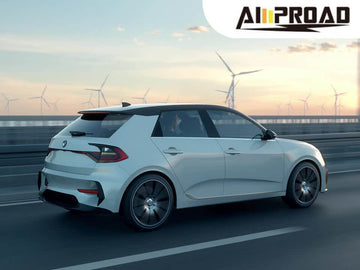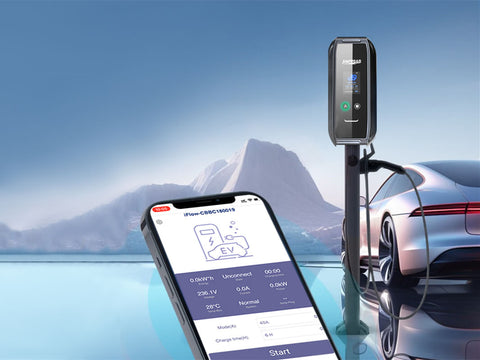
Fueling your electric vehicle (EV) is different than filling a gas tank. Understanding your charging options is crucial for a smooth ride. This exploration will unveil the mysteries of EV charging, explaining Level 1, Level 2, and DC Fast Charging. By the end, you'll be equipped to choose the perfect charger for your needs and daily driving habits.
What Are Your Needs?
In the transition towards electric vehicles (EVs), understanding your specific requirements is paramount. By assessing various factors, you can ensure that your charging solution aligns perfectly with your lifestyle and preferences. Here's a breakdown of key considerations under the question: What Are Your Needs?
Daily Driving Habits: How Far Do You Typically Drive Each Day?
Determining your daily driving distance provides insight into the charging capacity you require. Whether you have a short commute or frequently embark on longer journeys influences the type of charging infrastructure best suited for your needs.
Access to Charging at Work or Public Stations
Evaluate the availability of charging options outside your home environment. Access to charging facilities at your workplace or public stations can significantly impact your charging strategy and influence the type of EV you choose.
Home Electrical System Capacity (Consult an Electrician if Needed)
Assessing your home's electrical system capacity is crucial for installing a charging solution. Consulting an electrician ensures compatibility and safety, especially if upgrades are necessary to support the charging infrastructure.
Desired Charging Speed (Overnight vs. Quick Top-Ups)
Consider your preference regarding charging speed. Whether you prioritize overnight charging for convenience or require quick top-ups for flexibility during the day influences the type of charging equipment and power levels suitable for your needs.
Budget for the Charging Solution
Establishing a budget helps narrow down options and ensures financial feasibility. From the cost of equipment installation to potential upgrades, understanding your budgetary constraints guides decision-making towards an economically viable charging solution.
So, understanding your needs is fundamental to selecting the most suitable electric vehicle charging solution. By considering factors such as daily driving habits, access to charging infrastructure, home electrical system capacity, desired charging speed, and budgetary constraints, you can make informed decisions that optimize your EV ownership experience.
Types of EV Chargers
When considering electric vehicle (EV) chargers, it's crucial to understand the various options available and their respective benefits and drawbacks. Let's delve into the three primary types:
Level 1 Charging:
Level 1 charging is the most basic form and utilizes a standard household outlet. While it's the slowest method of charging, it offers several advantages. Its simplicity makes it inexpensive and readily available, requiring no additional infrastructure beyond a standard outlet. However, the main drawback is the extended charging times, often exceeding 12 hours for a full charge.
Level 2 Charging:
Level 2 chargers use a dedicated wallbox charger, providing faster charging compared to Level 1. The significant advantage of Level 2 charging is its improved speed, typically allowing for a full charge within 4 to 8 hours. While offering faster charging times, Level 2 chargers necessitate installation and come at a higher cost than Level 1 options. Despite this, their efficiency and convenience make them a popular choice for residential EV owners.
AMPRAOD Level 1 and Level 2 Dual-Use EV Charger:
AMPRAOD introduces an innovative solution with their Level 1 and Level 2 dual-use EV charger. This versatile charger offers the flexibility to operate at both Level 1 and Level 2 charging speeds, catering to a wide range of charging needs. Whether you require the convenience of Level 1 charging or the faster speeds of Level 2, this dual-use charger provides the best of both worlds. With AMPRAOD's advanced technology, EV owners can enjoy efficient and convenient charging options without the need for multiple charging stations.
DC Fast Charging:
DC fast charging stands out as the fastest charging option available, primarily found at public charging stations. Its main advantage lies in its rapid charging capability, capable of adding significant range to an EV in as little as 20 to 30 minutes. However, it's important to note that DC fast charging is not suitable for regular use due to its potential to degrade battery health over time. Additionally, the cost per kilowatt-hour (kWh) for DC fast charging tends to be higher than other methods.
Choosing the Right Charger:
Each type of charger caters to different needs and circumstances. Level 1 chargers are ideal for occasional use or situations where charging speed isn't a primary concern. Level 2 chargers strike a balance between speed and convenience, making them suitable for everyday residential charging. Meanwhile, DC fast charging is best reserved for long journeys or situations where rapid charging is essential.
How to Choose the Right Charger?

Selecting the appropriate electric vehicle (EV) charger is crucial to ensure optimal performance, efficiency, and convenience. Here are essential factors to consider when choosing the right charger for your EV:
Match Charging Speed to Your Daily Needs:
Understanding your daily driving habits is paramount in determining the suitable charging speed for your EV. For regular daily charging at home, a Level 2 EV charger is typically the ideal choice. Its faster charging times compared to Level 1 chargers accommodate the need for reliable daily charging. However, if you frequently embark on long-distance trips and require rapid charging, consider investing in a DC Fast Charging option. This ensures that your EV is equipped to handle occasional trips with minimal downtime.
Consider Your Home Electrical System Capacity:
Before installing a Level 2 charger at home, it's essential to assess your electrical system's capacity. Ensure that your home's electrical infrastructure can support the power requirements of a Level 2 charger without overloading the circuit. Consulting with an electrician is advisable to determine if any upgrades are necessary to accommodate the charger safely and efficiently.
Look for Features Like Smart Charging Capabilities:
Opting for a charger with smart charging capabilities can enhance convenience and efficiency. Features such as scheduling charging sessions for off-peak hours allow you to take advantage of lower electricity rates and reduce strain on the grid during peak demand periods. Smart chargers also offer remote monitoring and control, enabling you to manage charging sessions conveniently via a mobile app.
Compare Costs of Charger, Installation (Level 2), and Electricity Rates:
When evaluating charger options, consider not only the upfront cost of the charger itself but also the installation expenses, particularly for Level 2 chargers. Installation costs may vary depending on factors such as electrical upgrades, labor, and permitting requirements. Additionally, compare electricity rates to estimate the ongoing operational costs of charging your EV. Some utility providers offer special EV charging rates or incentives, further influencing the overall cost-effectiveness of your charging solution.
Thus, choosing the right charger for your electric vehicle involves careful consideration of various factors, including your daily charging needs, home electrical infrastructure, desired features, and overall cost. By matching the charging speed to your driving habits, ensuring compatibility with your home electrical system, leveraging smart charging capabilities, and evaluating the total cost of ownership, you can make an informed decision that maximizes the efficiency and convenience of charging your EV.
Additional Considerations

When selecting an electric vehicle (EV) charger, several additional factors warrant attention to ensure a seamless charging experience. Here are essential considerations to enhance safety, convenience, and compatibility:
Safety Features of the Charger:
Prioritize chargers equipped with robust safety features and certifications to safeguard both your vehicle and electrical system. Look for chargers compliant with industry standards such as UL (Underwriters Laboratories) certification, indicating adherence to rigorous safety and performance requirements. Ensuring the charger meets these standards provides peace of mind regarding its reliability and safety during charging sessions.
Warranty on the Charger:
Investing in a charger with a comprehensive warranty offers protection against potential malfunctions or defects, providing reassurance and potentially saving on repair or replacement costs. Review the warranty terms and coverage period offered by the manufacturer to make an informed decision. A longer warranty period typically indicates the manufacturer's confidence in the charger's quality and durability.
Cable Length:
Consider the length of the charging cable to ensure it reaches your vehicle's charging port comfortably. Opting for a charger with an appropriate cable length minimizes the need for additional extensions or adjustments, enhancing convenience during charging sessions. Measure the distance from the charger installation location to your vehicle's charging port to determine the optimal cable length required for efficient charging.
Future-Proofing:
As the EV market continues to evolve with new models and technologies, future-proofing your charging infrastructure is essential. Select chargers compatible with a wider range of EVs, including both current and upcoming models, to accommodate potential changes in your vehicle fleet or preferences. Consider versatile charging solutions such as the J1772 charger, which is compatible with various EV brands, or Tesla destination charger designed specifically for Tesla vehicles. Choosing a charger with broad compatibility ensures long-term usability and flexibility as the EV landscape evolves.
In addition to evaluating charging speed, compatibility, and installation requirements, paying attention to these additional considerations enhances the overall effectiveness and convenience of your EV charging setup. Prioritizing safety features, securing a robust warranty, selecting an appropriate cable length, and future-proofing your charging infrastructure contribute to a reliable and efficient charging experience. By carefully assessing these factors, you can confidently select an EV charger that meets your needs and preferences while ensuring optimal performance and peace of mind.
FAQs / People Also Ask
Q1: What is a J1772 charger, and how does it differ from other EV chargers?
A1: The J1772 charger is a standardized charging connector used for electric vehicles (EVs) in North America. It features a unique plug design compatible with a wide range of EVs, making it a popular choice for residential and public charging stations. Unlike proprietary chargers specific to certain EV manufacturers, the J1772 charger offers versatility, allowing EV owners to charge different makes and models with the same connector.
Q2: What are Tesla destination chargers, and who can use them?
A2: Tesla destination chargers are charging stations specifically designed for Tesla vehicles. These chargers are typically installed at destinations such as hotels, restaurants, and shopping centers, providing Tesla owners with convenient charging options while away from home. While primarily intended for Tesla vehicles, some destination chargers may also feature J1772 connectors, allowing non-Tesla EV owners to utilize the charging infrastructure.
Q3: What factors should I consider when choosing the cable length for my EV charger?
A3: When selecting the cable length for your EV charger, consider the distance from the charger installation location to your vehicle's charging port. Opt for a cable length that comfortably reaches your vehicle without requiring additional extensions or adjustments. Measure the distance accurately to ensure efficient and convenient charging without any limitations or inconvenience.
Q4: How can I future-proof my EV charging infrastructure?
A4: Future-proofing your EV charging infrastructure involves selecting chargers that are compatible with a wide range of EVs, including current and upcoming models. Choose versatile charging solutions such as the J1772 charger or Tesla destination chargers with broad compatibility to accommodate potential changes in your vehicle fleet or preferences. By opting for chargers that support multiple EV brands, you can ensure long-term usability and flexibility as the EV market evolves.



